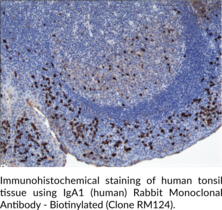Territorial Availability: Available through Bertin Technologies only in France
- Correlated keywords
- ImmunoglobulinA Ig A IgA 1 2 auto immune
- Product Overview:
Immunoglobulin A (IgA) is a member of the immunoglobulin superfamily of glycoproteins with roles in host defense against intestinal pathogens and both quantitative and qualitative control of host commensal microbiota composition.{53918,53919} Human IgA consists of two identical light chains of approximately 25 kDa each, as well as two heavy chains of approximately 60 kDa each that contain C-terminal extensions, known as tailpieces, which allow for IgA oligomerization.{53927,53925} There are two IgA subclasses, IgA1 and IgA2, which are encoded by IGHA1/?1 and IGHA2/?2, respectively, and have differences primarily in the hinge and heavy chain constant regions.{53925} IgA is produced by B cells and later secreted by plasma cells and is the most abundant antibody on mucosal surfaces that comprises at least 70% of all Ig produced in mice.{53918,53919} Monomeric IgA1 is predominant in the serum, but dimeric secretory IgA (SIgA) is the predominant form in mucosal surfaces and secretions with the ratio of subclasses varying based on the IgA-secreting cell types present.{53925,53921} Dimeric and polymeric IgA bind to Ig? Fc receptor I (Fc?RI) and the IgM- and IgA-binding high affinity Ig? and Igµ Fc receptor (Fc?/µ-R), which are both involved in mediating immune responses.{53921,53922} Production of IgA is induced in the gut only in animals containing intestinal microbes, and the number of IgA-producing plasma cells is reduced in germ-free mice.{53918} The extended hinge region of IgA1 contains O-linked glycan side chains, which have altered galactosylation and form circulating immune complexes in patients with IgA neuropathy (IgAN), an autoimmune inflammatory disease characterized by IgA1-containing deposits in the glomerular mesangium, tea-colored urine, proteinuria, and, potentially, renal failure.{56183,56184} IgA levels are increased in certain gastrointestinal tract and liver diseases, with IgA1 levels increased to a higher degree than IgA2 levels in patients with chronic hepatitis.{56183} Cayman’s IgA1 (human) Rabbit Monoclonal Antibody – Biotinylated can be used for ELISA, immunocytochemistry (ICC), and immunohistochemistry (IHC) applications.
Cayman Chemical’s mission is to help make research possible by supplying scientists worldwide with the basic research tools necessary for advancing human and animal health. Our utmost commitment to healthcare researchers is to offer the highest quality products with an affordable pricing policy.
Our scientists are experts in the synthesis, purification, and characterization of biochemicals ranging from small drug-like heterocycles to complex biolipids, fatty acids, and many others. We are also highly skilled in all aspects of assay and antibody development, protein expression, crystallization, and structure determination.
Over the past thirty years, Cayman developed a deep knowledge base in lipid biochemistry, including research involving the arachidonic acid cascade, inositol phosphates, and cannabinoids. This knowledge enabled the production of reagents of exceptional quality for cancer, oxidative injury, epigenetics, neuroscience, inflammation, metabolism, and many additional lines of research.
Our organic and analytical chemists specialize in the rapid development of manufacturing processes and analytical methods to carry out clinical and commercial GMP-API production. Pre-clinical drug discovery efforts are currently underway in the areas of bone restoration and repair, muscular dystrophy, oncology, and inflammation. A separate group of Ph.D.-level scientists are dedicated to offering Hit-to-Lead Discovery and Profiling Services for epigenetic targets. Our knowledgeable chemists can be contracted to perform complete sample analysis for analytes measured by the majority of our assays. We also offer a wide range of analytical services using LC-MS/MS, HPLC, GC, and many other techniques.
Accreditations
ISO/IEC 17025:2005
ISO Guide 34:2009
Cayman is a leader in the field of emerging drugs of abuse, providing high-purity Schedule I-V Controlled Substances to federally-licensed laboratories and qualified academic research institutions for forensic analyses. We are certified by ACLASS Accreditation Services with dual accreditation to ISO/IEC 17025:2005 and ISO Guide 34:2009.





